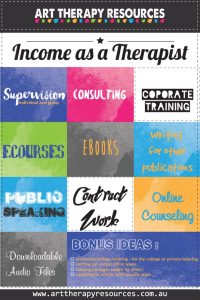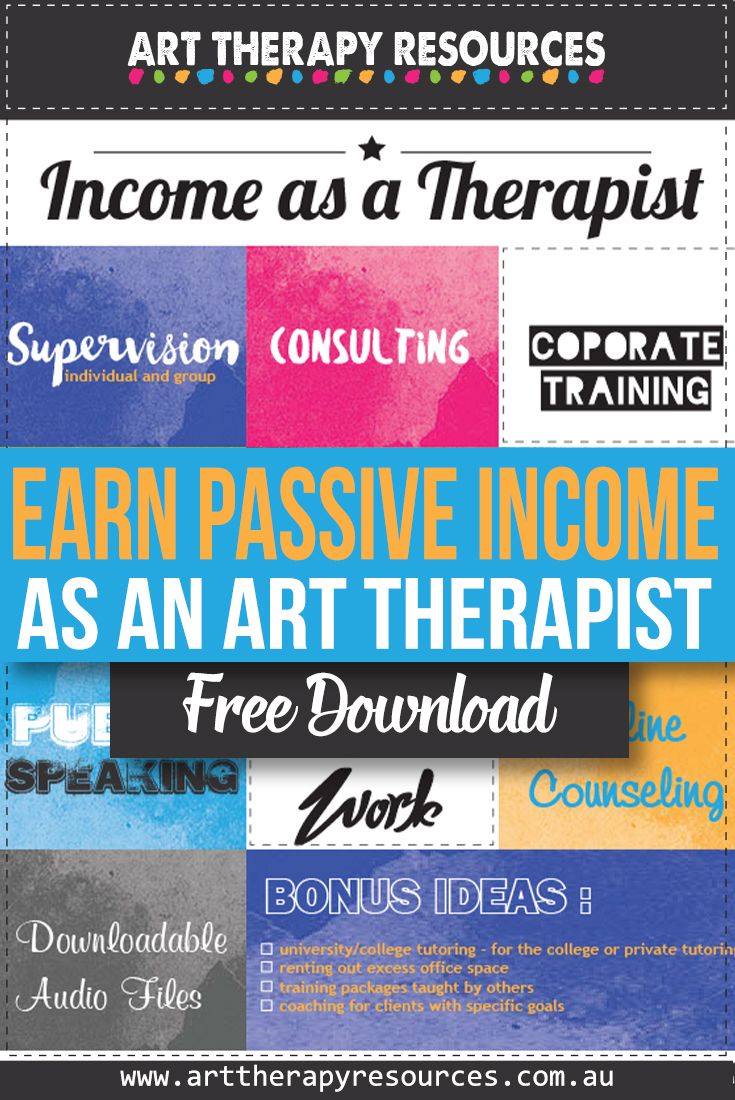THIS POST INCLUDES:
1. What is passive income?
2. Passive income ideas for a therapist
3. Create a passive income product
4. Free Download Income as a Therapist
WHAT IS PASSIVE INCOME?
Additionally, your therapeutic interests may change over time or you may also want to take some time off for a short or extended period of time which will result in a significant drop in therapy session income.
Some alternative methods of earning income still require your time to provide services, however, you have the flexibility of adding passive earning income opportunities.
Having alternative income sources provides you with the flexibility to earn income outside of your core therapy service. Through passive income, you can make purposeful choices about the level of client work you undertake. This can have positive benefits for you and your clients when you have the opportunity to take on more purpose orientated client work to ensure you remain enthusiastic about your work and reduce the impact of potential burnout.
Passive income doesn’t imply you don’t need to put in actual effort to earn income. It means you can create a product once and then sell it multiple times. Your efforts would then go into marketing your product to ensure it keeps selling.
Some people may think that passive income refers to any other income you earn that isn’t one-to-one client work, however, this is not the case. Some work outside of client work is still considered active income earning. For example, workshops that are delivered to multiple participants may mean you can earn more income by providing a service to many people at the same time, however, it is still necessary for your time and effort to be used for each workshop that you provide.
On the other hand, workshops provided online can be delivered through recorded videos to many people. In this case, you record the videos once (do the work once) and then resell the workshop material as many times as you like. In this case, an online workshop delivered through pre-recorded videos is considered a method of earning passive income. You had to invest your initial time to record the videos, however, after your first sale, every other sale is considered passive because you do not have to repeat the content each time to every participant or group of participants.
Examples of passive income for a therapist include:
- Ebooks
- Online courses
- Licensing a program to other therapists or content providers
- Providing media content, eg. meditation videos or images based on your art
- Print on demand products
- Subletting space in your office to another therapist
- Developing a paid app for clients or other therapists
You can also earn passive income from the following services:
- Affiliate income – examples include Amazon affiliate links
- Podcast – income can come from sponsorships or advertising
- YouTube – income can come from advertising revenue derived from YouTube advertisers or sponsors.
These are all legitimate ways of earning extra income, however, for a therapist, there may be potential issues to consider. When you are associating your therapeutic services with advertisers, this can have the potential to create a conflict of interest whereby you may be seen as influencing a vulnerable audience to make purchases that may appear as being endorsed by you.
Additionally, audience members may feel obliged to help generate income for you if they feel they are gaining benefits from your products and services. This is not usually a problem where the boundaries are clearly defined between service provider and audience member, however, in the case of mental health, it is useful to consider the context of who your audience members are and whether issues of influence and boundaries are to be considered.
The below posts about ethical considerations for therapists may provide some additional information for you to consider when pursuing passive income opportunities:
PASSIVE INCOME IDEAS FOR A THERAPIST
As you think about what methods might suit you, also try and see how some of the methods can be implemented in connection with each other.
For example, you may write an ebook, which you can then turn into an ecourse, which you can then develop into bonus audio files for purchase. One idea and one concept can be developed and delivered in a variety of ways. This provides you with an opportunity to fully utilise your content as well as provide alternative options for consumers to engage in your services and products.
Not every idea you have will be successful in creating passive income for you. As a business owner, you learn to identify the most successful parts of your therapy practice and how you can use those skills you have to convert them to ways in which to earn passive income.
For example, if you have a niche market in helping children with ADHD, you may find that you can create a downloadable book for parents. The products you create don’t have to outsource your therapy skills. Instead, the products can act as a way to support your current client practice.
We’ve included some ideas above on passive income ideas for a therapist. Below are some blog articles we’ve previously written to use as a guide to creating products that may generate passive income for therapists:
- 30 Day Launch to Your First Online Course
- 30 Days to Create Your Therapy Ebook
- How Do I Create an Ecourse for my Therapy Practice
- How to Create an Art Therapy Supplies Kit
- How to Create Art Index Cards for Your Therapy Business
- How to Create Physical Products for your Art Therapy Practice
- How to Write a Curriculum for an Art Therapy Group
- How to Write Educational Content for Your Therapy
CREATE A PASSIVE INCOME PRODUCT
Below are some steps you can take to help identify a potential passive income product for your therapy practice:
- Review your current client work to identify any potential niche topics. Eg clients with ADHD, chronic pain, teenagers, older clients etc
- Identify your demographic (for clients, support systems, colleagues, or students)
- Assess your skills – if you are skilled at speaking, consider a series of video workshops. Maybe you are more skilled at writing and would prefer writing a workbook instead.
- Develop a plan – identify the physical, financial, and time resources required to create the product. Be realistic and understand that we all succumb to the planning fallacy of underestimating the time and effort required to complete a project.
- Create an outline for your product
- Create your product
- Sell your product
Use your plan to set a deadline and learn how to pace yourself as you create your product. If you are already juggling a lot of things, focus on all the small steps you can take to complete your project. Just the act of deciding on a name for your project is a step further than you were before!
For a more detailed look at how you can create a product in 30 days, check out our 30 day launch articles:
FURTHER READING
FREE DOWNLOAD

BUILD YOUR ART THERAPY REFERENCE MATERIALS:
Pin this image to your Pinterest board.

SHARE KNOWLEDGE & PASS IT ON:
If you’ve enjoyed this post, please share it on Facebook, Twitter, Pinterest. Thank you!
